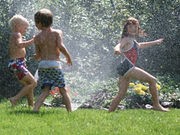 From our friends at HealthDay News
From our friends at HealthDay News
Children with attention-deficit/hyperactivity disorder (ADHD) are often treated with medications, such as Adderall or Ritalin. But a new study suggests that parents can also help their kids by promoting healthy lifestyle habits.
For the study, researchers looked at 184 children with ADHD and 104 without the disorder. The investigators found that those with ADHD were less likely to adhere to healthy behaviors recommended by the American Academy of Pediatrics, the National Sleep Foundation and other organizations.
Those guidelines include no more than one to two hours of total screen time a day (TV, computers, video games); at least one hour of physical activity a day; limited intake of sugar-sweetened beverages; getting nine to 11 hours of sleep a night; and drinking seven to 10 cups of water daily, depending on age. The kids in the study were aged 7 to 11.
The findings, published online recently in the Journal of Attention Disorders, suggest that following more of these healthy habits could benefit children with ADHD.
“Many parents of children diagnosed with ADHD do not want their children on medication. Having their children follow healthy lifestyle behaviors may be an effective intervention, either alongside or in the place of traditional ADHD medications,” said study author Kathleen Holton. She is a member of the Center for Behavioral Neuroscience at American University in Washington, D.C.
“Parents of children with ADHD should talk with their pediatrician about how to improve health behaviors, such as limiting screen time, encouraging physical activity, improving bedtime routines and drinking water rather than other beverages,” she suggested in a university news release.
Changing a number of lifestyle habits at once may lead to other healthy behaviors, according to Holton.
“For example, physical activity increases thirst, making water consumption more attractive. Physical activity can also offset screen time and can improve sleep,” she explained.
“Similarly, removal of caffeinated beverages prevents their diuretic effect, helps increase water consumption and can help prevent sleep disturbance,” she added.
“As research into health outcomes in children with ADHD continues to provide new insights, focusing on the overall number of healthy lifestyle behaviors may become important,” Holton said.
